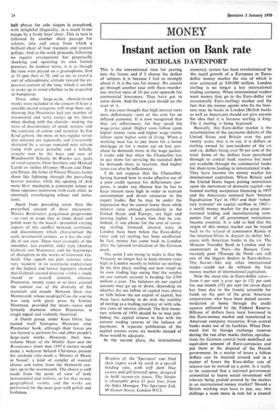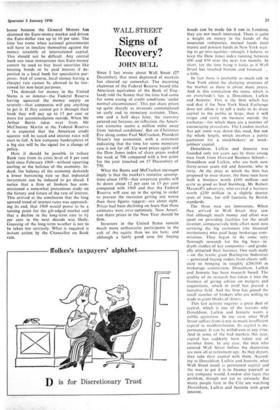MONEY Instant action on Bank rate
NICHOLAS DAVENPORT
This is the conventional time for peering into the future and if I choose the dullest of subjects it is because I feel so strongly about it. It is the rate for money. We cannot go through another year with these murder- ous interest rates of 10 per cent upwards for commercial borrowers. They have got to come down. And the new year should see the start of it.
It was once thought that high interest rates were deflationary—part of the cure for an inflated economy. It is now recognised that they are inflationary; for they speed the wage-price spiral. Higher costs follow upon higher money rates and higher wage claims follow upon higher costs of living. When a working man has to pay more for a house mortgage or for a motor car on hire pur- chase he demands more in the wage packet. I might add that when the Chancellor has to pay more for servicing the national debt he demands more in taxation. And higher taxes can also be inflationary.
I do not suppose that the Chancellor, having learned how to make effective use of a pure credit squeeze for deflationary pur- poses, is under any illusion that he has to keep interest rates high in order to restrain consumption and divert resources to the export trades. But he may be under the impression that he cannot lower them while interest rates abroad, particularly in the United States and Europe, are high and moving higher. I assure him that he can. Indeed, if one allows for the cost of cover- ing sterling forward, interest rates in London have been below the Euro-dollar rates and yet sterling has been unaffected. In fact, money has come back to London after the upward revaluation of the German mark.
The point I am trying to make is that the Treasury no longer has to keep interest rates high in London merely to bolster up sterling. In the first place, sterling can now stand on its own trading legs seeing that the surplus on our current account is heading for £500 million a year. The balances on our capital account may go up or down, depending on whether the net inflow of capital rises above or falls below the net export of capital, but these have nothing to do with the stability of sterling as a trading currency or with rela- tive rates of interest abroad. The first mone- tary reform of 1970 should be to stop pub- lishing the capital returns in line with the current trading returns of the balance of payments. A separate publication of the capital returns every six months instead of three would be adequate.
In the second place, the international monetary system has been revolutionised by the rapid growth of a European or Euroi dollar money market the size of which is now estimated at $40,000 million. London sterling is no longer a key international trading currency. When international traders want money they go to the Euro-dollar (or occasionally Euro-sterling) market and the fact that the money agents who fix the busi- ness may be banks in London (British banks as well as American) should not give anyone the idea that it is because sterling is king. The f sterling is being bypassed.
Basically, this Euro-dollar market is the accumulation of the payments deficits of the United States and Britain over the past twenty years, that is to say, it is dollars or sterling owned by non-residents of the us and UK, dollars being over 90 per cent of the total. Some of the dollars have percolated through to central bank reserves but most are available through the commercial banks for short-term lending in international trade. They have become the money market for international capitalism. When Britain and the United States began putting restrictions upon the movement of domestic capital—we banned sterling acceptance financing in 1957 and the Americans imposed their 'Interest Equalisation Tax' in 1963 and their 'volun- tary restraint' on capital outflow in 1965- a world money market for the great inter- national trading and manufacturing com- panies free of all government restrictions became essential. It is odd to find that the origin of this money market can be traced back to the refusal of communist Russia in the nineteen-fifties to deposit its dollar bal- ances with American banks in the us. The Moscow Narodny Bank in London and its counterpart in Paris—the Banque Corn- merciale pour l'Europe du Nord—are still one of the biggest dealers in Euro-dollars. The Soviet—like any other international trader—could not do without the free money market of international capitalism.
Now the steep rise in Euro-dollar rates— from 6 per cent a year ago to 12f per cent for one month (15+ per cent for seven days) has been due to the frantic scramble for funds on the part of the great American corporations who have been denied accom- modation at home through the credit squeeze enforced by the Federal Reserve. Billions of dollars have been borrowed in this Euro-money market and transferred to American company treasuries. Even central banks make use of its facilities. When Den- mark lost its foreign exchange reserves during the run after marks (before upvalua- tion) the German central bank mobilised an equivalent amount of Euro-currencies and put them at the disposal of the Danish government. In a matter of hours a billion dollars can be shunted around and in a matter of hours the Euro-dollar rate of interest can be moved up a point. Is it really to be supposed that a national government committed to heavy social investment will tolerate being pushed around by the dealers in an international money market? Should a 'British working man have to pay, say, two shillings a week more in rent for a council
house because the General Motors has skimmed the Euro-money market and driven the Euro-dollar rate up to 10 per cent. The time has come when national governments will have to insulate themselves against the money scramble of international capital. This should not be difficult. Any central bank can issue instructions that Euro-money cannot be used to buy local securities like housing bonds or be paid interest if de- posited in a local bank for speculative pur- poses. And of course, local money having a cheaper rate cannot be allowed to be bor- rowed for non-local purposes.
The demand for money in the United States is so intense—the Federal Reserve having squeezed the money supply so severely—that companies will pay anything to get it. If they cannot get it through their bank they will pay up to 15 per cent or more for accommodation outside. When Mr Arthur Burns takes over from Mr McChesney Martin at the Federal Reserve it is expected that the American credit squeeze will be eased and interest rates will start to fall. A few company bankruptcies of a big size will be the signal for a change of policy.
Here it should be possible to reduce Bank rate from its crisis level of 8 per cent held since February 1969—without upsetting sterling or the balance of the economy. In- deed, the balance of the economy demands a lower borrowing rate so that industrial investment can be induced to go ahead. I notice that a firm of brokers has com- missioned a somewhat pretentious study on the history and future of the rate of interest. This arrived at the conclusion that the long upward trend of interest rates was approach- ing its end, that 1969 would prove to be a turning point for the gilt-edged market and that a decline in the long-term rate to 6f per cent in the next decade was likely. Guessing of the long-term weather is not to be taken too seriously. What is required is instant action by the Chancellor on Bank rate.
ffolkes's taxpayers' alphabet
D is for Discretionary Trust















































 Previous page
Previous page